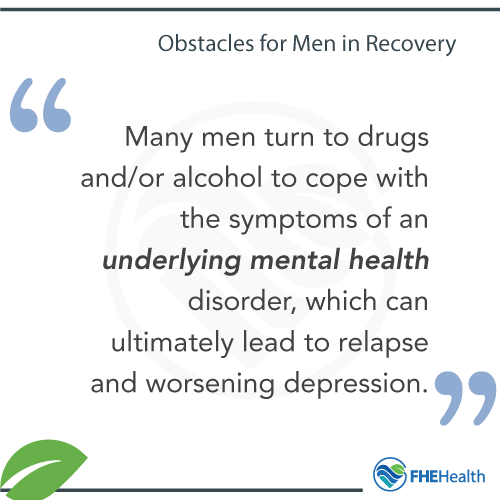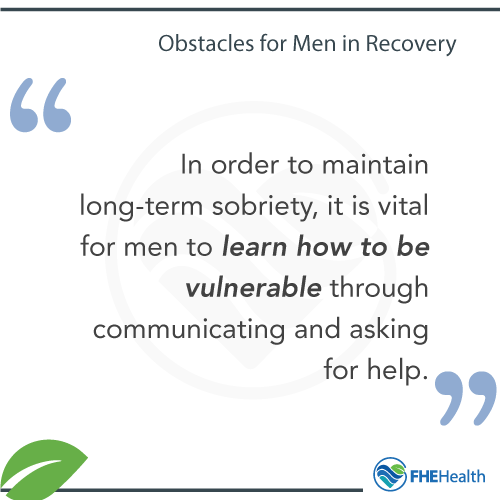
In early recovery, men face multiple challenges and barriers that may interfere with them from getting the help they need. Cultural expectations and societal pressures leave the impression that men are to assume the role of being strong, fearless, and in control. These unhealthy and unrealistic expectations produce the ideology that “being a man” means you do not need help, never struggle, and admitting to a problem is a sign of weakness or defeat. Masculinity has become synonymous with ignoring or denying pain, trauma, mental health issues, and addiction.
Often, men have a difficult time asking for help and seeking treatment. It is not impossible to overcome these challenges. However, once these men ask for help and complete treatment, there are still several obstacles that they may face in recovery. It is important that men – in early recovery – be vigilant about maintaining their recovery, connected to a strong support system, and let go of the societal influenced unhealthy thinking. If these gender-specific risk factors are not addressed, men may be more vulnerable to potential relapse.
Men and Addiction
 According to the National Institute on Drug Abuse, drug and alcohol addiction is more prevalent among men than it is women. Men are two times more likely than women to develop a drug problem; and in the case of alcohol, men are three times more likely than women to develop such a problem.
According to the National Institute on Drug Abuse, drug and alcohol addiction is more prevalent among men than it is women. Men are two times more likely than women to develop a drug problem; and in the case of alcohol, men are three times more likely than women to develop such a problem.
It’s no secret that men often have a higher drinking threshold than women. Alcohol also ignites a greater sense of pleasure in the brains of men over women. Researchers from Columbia and Yale conducted a study amongst male and female college-aged drinkers. Studies revealed that men had more significant dopamine release than women. In other words, men received a higher sense of pleasure when intoxicated.
Obstacles For Men in Recovery
 While it is common for men to drink to enhance their good mood, men also drink to cope, self-medicate, and avoid societal pressures, undiagnosed mental health disorders, gender identity issues, sexual health, and custody rights. Fears of vulnerability and lack of masculinity may prevent men from receiving the help they need.
While it is common for men to drink to enhance their good mood, men also drink to cope, self-medicate, and avoid societal pressures, undiagnosed mental health disorders, gender identity issues, sexual health, and custody rights. Fears of vulnerability and lack of masculinity may prevent men from receiving the help they need.
Societal Stigmas
There is a distinct culture of silence surrounding men’s health, mental health, and other issues. These distortions can be significant barriers for men in early recovery. Across many cultures, men are encouraged and expected to be self-controlled and self-sufficient over asking others for help. It’s not uncommon for men to be praised for living up to the “strong and silent” cultural stigmas. However, this may lead to men feeling that if they admit they need help or they have a problem, then they are compromising their masculinity. This ideology has been a major contributing factor to relapse and even potential overdose.
Undiagnosed and Untreated Mental Health Disorders
 Another significant barrier for men in recovery is undiagnosed psychiatric disorders. More than half of individuals struggling with substance abuse also suffer from a co-occurring mental health disorder. Untreated depression, PTSD, bipolar disorder, and other personality disorders frequently lead to relapse. Men often exhibit different symptoms of depression, such as irritability, anger, aggression, and rage — ultimately engaging in reckless behavior. The stigmas mentioned above play a significant role in men choosing to self medicate over seeking professional help. Many men turn to drugs and/or alcohol to cope with the symptoms of an underlying mental health disorder, which can ultimately lead to relapse and worsening depression.
Another significant barrier for men in recovery is undiagnosed psychiatric disorders. More than half of individuals struggling with substance abuse also suffer from a co-occurring mental health disorder. Untreated depression, PTSD, bipolar disorder, and other personality disorders frequently lead to relapse. Men often exhibit different symptoms of depression, such as irritability, anger, aggression, and rage — ultimately engaging in reckless behavior. The stigmas mentioned above play a significant role in men choosing to self medicate over seeking professional help. Many men turn to drugs and/or alcohol to cope with the symptoms of an underlying mental health disorder, which can ultimately lead to relapse and worsening depression.
Social Expectations
 Social expectations of men may make it harder for an individual to maintain long-term sobriety. Stereotypical masculinity encompasses a self-sufficient concept. Men may feel they have their substance use and recovery under control. In order to maintain long-term sobriety, it is essential for the addicted to understand that the disease of addiction is a life long diagnosis that requires spiritual maintenance through treatment, 12 Step Fellowships, and sometimes therapy. Therapy and the 12 Steps require vulnerability — talking about pain, fear, and trauma. Many men are not privy to discussing their emotions in general, and it may be challenging for them to open up about their most painful feelings. In order to maintain long-term sobriety, it is vital for men to learn how to be vulnerable through communicating and asking for help.
Social expectations of men may make it harder for an individual to maintain long-term sobriety. Stereotypical masculinity encompasses a self-sufficient concept. Men may feel they have their substance use and recovery under control. In order to maintain long-term sobriety, it is essential for the addicted to understand that the disease of addiction is a life long diagnosis that requires spiritual maintenance through treatment, 12 Step Fellowships, and sometimes therapy. Therapy and the 12 Steps require vulnerability — talking about pain, fear, and trauma. Many men are not privy to discussing their emotions in general, and it may be challenging for them to open up about their most painful feelings. In order to maintain long-term sobriety, it is vital for men to learn how to be vulnerable through communicating and asking for help.
Gender-Specific Stressors
Often, men may face a ton of stressors in early recovery. Interpersonal relationships, financial obligations, relationships with children, and the role of being the head of the household provider are all common stressors that men face in recovery. Male or female, society has placed gender-specific requirements that each individual is expected to fulfill. Men are generally expected to be the provider and protector within the family unit. In early recovery, men may feel the need to acquire a high-paying job to maintain financial obligations, which can ultimately lead to more time spent working and less time committed to their recovery.
Financial stressors can also be a significant trigger for relapse. Men may also feel they are solely responsible for protecting and leading their family. Strained relationships with spouses and children — as well as absence due to attending treatment — may prevent them from fulfilling their expected duties as a father/husband. It is vital for men to discuss stressors and triggers with their sober support to promote long-term sobriety.
Romantic Relationships
Love and sex can provide the same mental euphoria — and dopamine release — that drugs and alcohol do. Romantic relationships, in early recovery, can be a dangerous endeavor for a recovering addict. Relationships and potential resulting stressors pose a significant threat to maintaining long-term sobriety. It is not uncommon for men to exchange one addiction for another. Romantic relationships and sex may become a coping mechanism in place of vulnerability and addressing substance abuse disorder. A minor setback or conflict may send the individual to struggle interpersonally and ultimately trigger feelings of guilt, shame, anxiety, depression, and low self-esteem. The primary focus in early recovery must be on addressing the addiction, seeking a spiritual solution, and putting his sobriety first.
Men’s Substance Abuse Recovery
Many men in recovery may find themselves struggling to stay sober because they are not engaging in the right support. Despite obstacles and challenges, long-term sobriety is possible for every individual in recovery. There are a ton of aftercare programs for substance abuse that provide essential tools for the success of any sober man or person. In order to maintain long-term sobriety, the following factors should be available for men in early recovery:
Social/Emotional Support
First and foremost, support systems are quintessential for men in recovery. Although men may be less motivated to maintain a social connection, a sober living program can promote a healthy social support group as his individual program progresses. Fellowship can provide insight for men who need help in asking for, accepting, and offering help to others.
Consistent Engagement in Treatment
It is essential for men in recovery to maintain a safe and welcoming environment in which they can discuss issues they may be facing and ask for help or advice on those issues. Aftercare programs such as IOP and 12 Step involvement can help men maintain accountability and consistent engagement in recovery. Most men are typically goal and action-oriented. Therefore, it is essential to encourage men to stay actively involved in their recovery to satisfy their sense of usefulness, control, and overall confidence.






